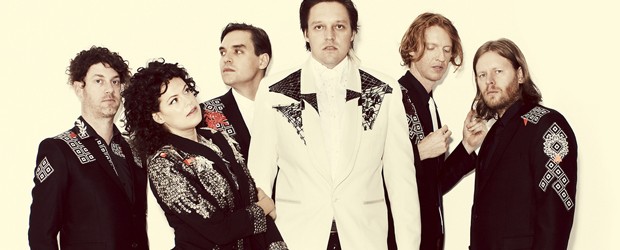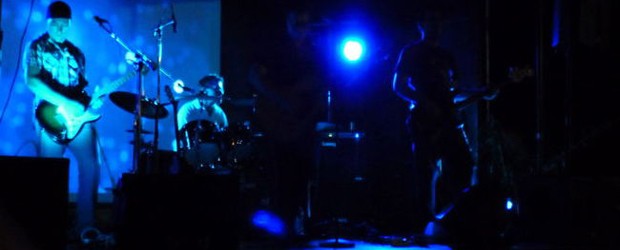Interpol

I look back on [our first tour] and it’s very romantic. We had no expectations of what was going to happen. We were all packed in a van and wore the same clothes for a week straight and then all of the sudden you just kind of end up at this higher level. We still go at it with the same mindset – it’s just our clothes are cleaner.
story by Sharyn Goldyn
photo by Pieter M. Van Hattem
Interpol knows how to keep a secret — and they have a very big one waiting to come out. It’s been three years since Interpol delivered their critically acclaimed sophomore album Antics on indie mainstay Matador Records and with their long-awaited new LP Our Love To Admire coming out this summer on Capitol Records, the band is keeping their lips firmly sealed about what to expect from their debut major-label offering.
“I’d rather wait and have the record speak for itself,” Interpol’s longtime drummer Sam Fogarino told a curious Chicago Innerview. “We don’t want to give it all away yet. We live in a day and age where everything happens so quickly. We did our first shows for the pre-release in Canada and immediately the new material was thrown up on YouTube — which is good, but when you put in many months of blood and sweat and people get their first glance of it recorded with the lowest fidelity on YouTube, it’s a little disheartening. We want people to hear how it’s meant to be heard.”
The band did recently announce the album cover art and track listings and their first single is spreading around the Internet, but Fogarino was pretty vague about what to expect. Instead, he gave the dirt on the creative process behind the album and why it took over a year to write and record.
“The first two albums were one constant movement, one record smearing into another,” he said. “There was absolutely no pressure when we were writing this album — the whole process from writing to recording was so exciting. There is the feeling of reaching the higher plane this time around.”
One of the biggest challenges for the band this time around was making the new material as fresh as possible while still maintaining that signature Interpol sound. “We knew we had to push the envelope, but you can’t do it forcefully,” explained Fogarino. “It is a major challenge to push yourself artistically but have it happen organically at the same time so it doesn’t sound forced. I think the minute that it becomes too easy, this band will cease to exist. We are the same guys playing the same instruments, but we are pushing boundaries. There is an expansion to the sound, but it still sounds like Interpol to me.”
Another sign of growth for the band (in addition to the new facial hair now being sported by bassist Carlos D) is their jump from Matador to Capitol for the July 10 release of Our Love to Admire. “It seemed like a logical conversion,” Fogarino explained. “They have known us for years and we had friends who had come and gone through the years at the label. For Interpol, this album is exactly the album we would have made whether it were a smaller label or not.”
It’s been a long steady climb for these dour, well-groomed NYC rockers since they first signed to Matador in 2002 after sending in a demo which reportedly flipped the minds of label co-owners Chris Lombardi and Gerald Cosloy. “Chris Lombardi was actually in Germany driving on the Autobahn really fast and he was listening to it and decided he wanted to sign the band,” Fogarino recalled.
Matador released the well-received debut album Turn On The Bright Lights and the band immediately found a rabid fan base and started touring. “Early Interpol shows were a thrill,” Fogarino said. “I recently saw some old, old pictures from our first tour when Bright Lights first came out. We all look like babies, there was such a naivete. I look back on it and it’s very romantic. We had no expectations of what was going to happen. We were all packed in a van and wore the same clothes for a week straight and then all of the sudden you just kind of end up at this higher level. We still go at it with the same mindset — it’s just our clothes are cleaner.”
Cleaner clothes aren’t the only things that have changed. “We played two nights at Radio City Music Hall, that’s something that if the band ended tomorrow it would still put a smile on my face,” Fogarino recalls. They were also invited on tour with The Cure for a month-long tour in 2004.
“I’ve met a lot of people who were musical heroes who have now become friends. I learned a lot from Robert Smith. Being accepted by someone like Robert Smith interjected a little more confidence in what we do. It was a little sense of arrival. He’s just the sweetest man you could ever meet but at the same time he is a total eccentric. It’s really him — that smeared lipstick isn’t a gimmick,” Fogarino said laughing. He then added, rather seriously, that you can’t let those good moments hold you down. “You don’t want to stop and smell the flowers for too long, you want to keep it going.”
Keeping things going is something they seem quite capable of. Interpol may be experiencing worldwide success and touring and writing music non-stop, but they seem to have settled into their 3-piece suits gracefully.
“Tour so far is pretty mellow; I try to keep a low profile,” Fogarino said. “I just focus on the 75 minutes I play on stage. To me, the party is kind of over. You have to expect the unexpected but I don’t facilitate that happening. But I always get in trouble in Chicago — a lot of my friends are there. I lived in Ukrainian Village for six months 11 years ago working for a record distributor.”
Fogarino has high regards for Chicago, saying he would love to play a residency here if he could. As for their upcoming sold-out Metro show this month (their first appearance in the city in nearly three years), fans can expect three to four new songs and mostly songs from the earlier albums.
Those unable to find tickets to the Metro show will get another chance this summer, when Interpol will be returning as one of the headlining acts of this year’s Lollapalooza. “I remember way back when Ministry and Lush were playing Lollapalooza and I really wanted to go. I have never been to a Lollapalooza,” Fogarino said. One can only hope that Interpol will unveil more new material at Fogarino’s first Lolla — including the cleverly-titled tracks “Heinrech Maneuver” and “No I In Threesome.”
Until then, we’ll just have to keep the secret.
Interpol :: Metro :: June 3.






